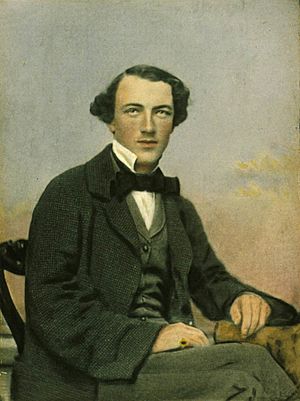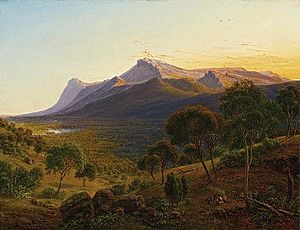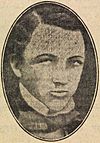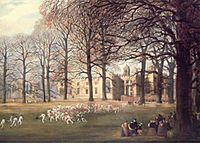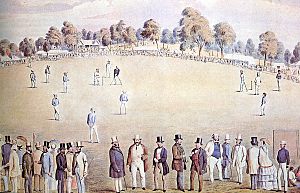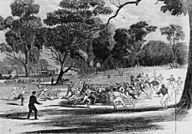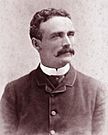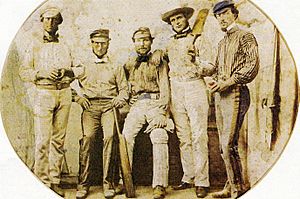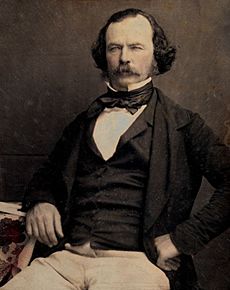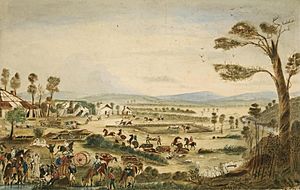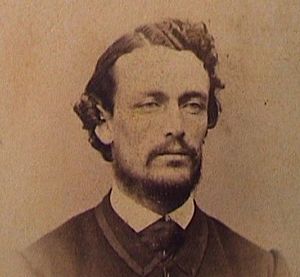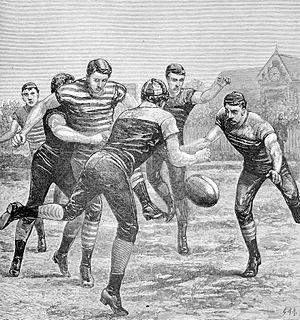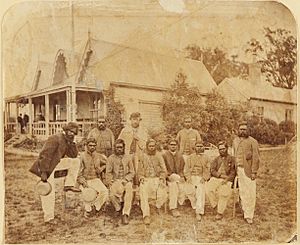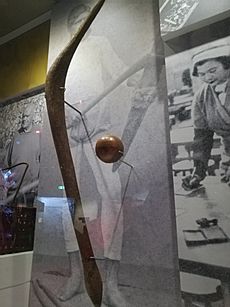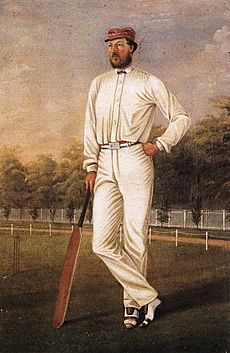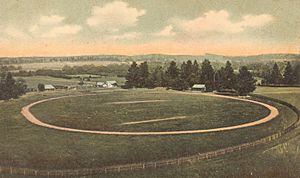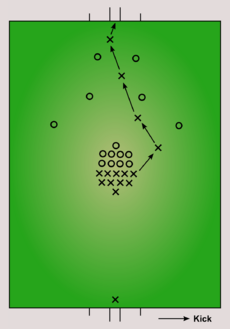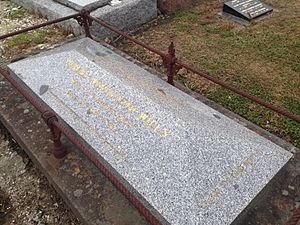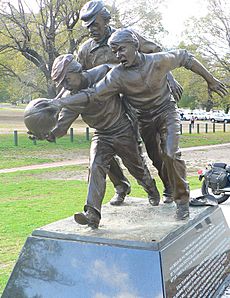Tom Wills facts for kids
Thomas Wentworth Wills (19 August 1835 – 2 May 1880) was an Australian sportsman. He is known as Australia's first important cricketer. He also helped start Australian rules football.
Tom Wills was born in the British colony of New South Wales. His family was wealthy. He grew up in the Australian countryside on large farms owned by his father, Horatio Wills. As a child, he became friends with local Aboriginal people. He learned their language and customs.
When he was 14, Wills went to England to study at Rugby School. There, he became the captain of the cricket team. He also played an early version of rugby football. After Rugby, Wills played cricket for Cambridge University. He also played for other top teams in England. People thought he was one of the best young cricketers.
Wills came back to Victoria in 1856. He became a famous cricketer across Australia. He led the Victorian team to many wins. In 1858, he wanted a sport for cricketers to play in winter. He asked for a "foot-ball club" with "rules". In 1859, he helped write the first rules for Australian rules football. These rules are still the basis of the game today. He and his cousin H. C. A. Harrison helped the game grow.
In 1861, Wills left sports to help his father run a farm in outback Queensland. Soon after, his father and 18 other people died in a large attack by Aboriginal people. Wills survived and returned to Victoria in 1864. In 1866–67, he led an Aboriginal cricket team on a tour in Australia.
Wills was Australia's first sports celebrity. After he died, people forgot about him for a while. But since the 1980s, he has become well-known again. Today, he is seen as a tragic sports hero. He also stands for reconciliation between Indigenous and non-Indigenous Australians.
Contents
Early Life and Family
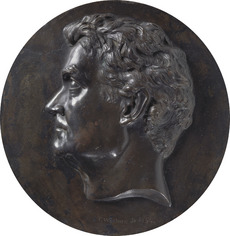
Tom Wills was born on August 19, 1835. This was near where Canberra is now. He was the first child of Horatio Wills and Elizabeth Wills. Tom's family had been in Australia for three generations. His grandparents on his mother's side were Irish convicts. His grandfather on his father's side was an English highwayman. He was sent to Australia as a convict in 1799.
His grandfather became rich in Sydney. He died in 1811. Tom's father, Horatio, became editor of Australia's first newspaper. He married Elizabeth in 1833. Tom was named Thomas Wentworth Wills after William Wentworth. Wentworth was a famous statesman.
Horatio Wills became a farmer in the 1830s. He moved his family to a sheep farm. Tom was very active as a child. In 1840, the Wills family moved south to the Grampians in Victoria. They settled on a large property called Lexington. This area was used by Djab wurrung Aboriginal groups.
Tom was one of the few white children there. He spent a lot of time with Aboriginal people. His cousin, H. C. A. Harrison, said Tom could learn Aboriginal songs. He could also speak their language very well. Horatio Wills liked that his son was friends with Aboriginal people. He let local groups live and hunt on his land.
Tom's first sister, Emily, was born in 1842. In 1846, Wills started school in Melbourne. He played his first cricket matches there. He also met people from the Melbourne Cricket Club. By 1849, his family had grown to include three brothers.
Time in England
School Days at Rugby
In February 1850, Tom Wills went to England. He was fourteen years old. His father sent him to Rugby School, a very famous school. Tom's father wanted him to study law at University of Cambridge. He wanted Tom to become an important professional in Australia.
Wills started playing cricket soon after arriving. He became a very good bowler. He was also a strong batsman. By April 1852, he joined the Rugby School team. He took many wickets in his first big game. Wills helped Rugby become the best cricket school in England.
Rugby School had its own version of football. Wills was one of the few players mentioned in newspapers. He was known for his creative play and quickness. He was also good at long and accurate kicks. Wills was also good at running games.
Wills was very athletic. He was tall and muscular. He was so focused on sports that he fell behind in his studies. He missed Australia a lot. He decorated his room with Aboriginal weapons. His father told him that his childhood friends, the Djab wurrung, often asked about him.
A Promising Cricketer
| Cricket information | |||||||||||||||||||||||||||
|---|---|---|---|---|---|---|---|---|---|---|---|---|---|---|---|---|---|---|---|---|---|---|---|---|---|---|---|
| Batting | Right-handed | ||||||||||||||||||||||||||
| Bowling | Right-arm medium | ||||||||||||||||||||||||||
| Role | All-rounder | ||||||||||||||||||||||||||
| Domestic team information | |||||||||||||||||||||||||||
| Years | Team | ||||||||||||||||||||||||||
| 1854 | Gentlemen of Kent | ||||||||||||||||||||||||||
| 1855 | Gentlemen of Kent and Surrey | ||||||||||||||||||||||||||
| 1855–1856 | MCC | ||||||||||||||||||||||||||
| 1855–1856 | Kent | ||||||||||||||||||||||||||
| 1856 | Kent and Sussex | ||||||||||||||||||||||||||
| 1856 | Gentlemen of Kent and Sussex | ||||||||||||||||||||||||||
| 1856 | Cambridge University | ||||||||||||||||||||||||||
| 1856/57–1875/76 | Victoria | ||||||||||||||||||||||||||
| 1863/64 | G. Anderson's XI | ||||||||||||||||||||||||||
| Umpiring information | |||||||||||||||||||||||||||
| FC umpired | 1 | ||||||||||||||||||||||||||
| Career statistics | |||||||||||||||||||||||||||
|
|||||||||||||||||||||||||||
|
Source: CricketArchive, 24 April 2012
|
|||||||||||||||||||||||||||
Wills finished school in June 1855. He was almost 20 years old. He was known as Rugby's best sportsman. People saw him mainly as a cricketer.
After school, Wills traveled around Britain playing cricket. He was called "one of the most promising cricketers". He played with important people and for top teams. He also joined the I Zingari, a club of rich amateur players. Wills did not go to Cambridge University to study. But he did play for the university's cricket team. He played against Oxford in 1856.
Wills spent six years in England. This time shaped his life. He enjoyed playing games and spending money. He would continue this way until he died.
Becoming a Colonial Hero
Wills returned to Melbourne, Australia, in December 1856. Melbourne had become a busy city because of the Victorian gold rush. His father, Horatio, was now a member of the Victorian Parliament. The Wills family lived on a farm near Geelong. Tom stayed with his extended family in Melbourne. He also started working at a law firm to please his father. But he never really practiced law.
Cricket was very popular in Australia in the 1850s. People in Victoria especially loved it. There was a strong rivalry between Victoria and New South Wales. Wills was expected to help Victoria win its first match against New South Wales.
Wills helped his team win by scoring 57 runs. The Age newspaper said his playing was very entertaining. In January 1857, Wills took ten wickets against New South Wales. But his team lost. Wills joined many clubs in Victoria. He played for the Corio Cricket Club and the Melbourne Cricket Club (MCC). He liked Corio more, but the MCC felt he belonged to them.
In January 1858, a big match was held in Melbourne. It was between Victoria and New South Wales. Wills was the captain for Victoria. He took 8 wickets. On the second day, he was hit by a ball and knocked out. He recovered and kept playing. He scored 49 runs and won the match for his team. The crowd cheered him loudly. Wills was now famous. People called him "the greatest cricketer in the land".
Wills was an amateur player. But he liked to spend time with professional cricketers. This sometimes caused problems with officials. In February 1858, a club in Tasmania did not want professional players. Wills was angry about this. He spoke out against it.
Wills was the MCC's secretary in 1857–58. He was not very organized. The club had money problems, and people blamed his poor management. In 1858, he left the club. This caused tension between Wills and the MCC.
Football Pioneer
Wills often wrote letters to newspapers about cricket. On July 10, 1858, a Melbourne newspaper published a letter from Wills. This letter helped start a new style of football. It is now called Australian rules football.
Wills wanted cricketers to stay active in winter. He said football should be a regular sport. He also helped start football in Melbourne's schools. Teachers were inspired by a book about Rugby School. Wills was seen as a real-life version of the book's hero.
Two weeks later, Wills' friend, Jerry Bryant, advertised a football game. This was one of several games that year involving Wills. Another important game started on August 7. It was between students from Scotch College and Melbourne Grammar. Wills was one of the umpires. These two schools still play each other every year. Wills was the most important person in Melbourne football in 1858. These early games were rough.
The Melbourne Football Club officially started on May 14, 1859. Three days later, Wills and three other members met. They were J. B. Thompson, Thomas H. Smith, and Hammersley. They met near the MCG to create the club's rules. They looked at rules from four English schools. Wills liked the Rugby game, but it was too violent. They decided to make ten simple rules. These rules were for grown men and Australian conditions. Wills was the first to sign the rules. He wrote that Rugby was not right for them. They needed a winter sport that was safer. Thompson and Hammersley helped spread the new rules. Wills' fame also helped football grow in Victoria.
Peak of Fame
After leaving the MCC, Wills played for any club he chose. He became president of Collingwood and vice-president of Richmond. He made Richmond a top club. Sometimes, Wills would join a team at the last minute. This changed the game so much that people stopped betting. Clubs still wanted Wills to play for them. He played or practiced cricket almost every day.
Wills remained captain for Victoria in January 1859. He broke his finger but still scored 15 runs. He also took 5 and 6 wickets. Victoria won the game. Later that year, Wills resigned from a committee. He was upset because he was criticized for not attending practice. In a practice match, Wills almost died from sunstroke. He felt he had to play for the large crowd. In February 1860, over 25,000 people watched Victoria play New South Wales. Wills was captain. He took 6 and 3 wickets. He also scored 20 runs. Victoria won.
The Melbourne media called Wills "Great Gun of the Colony". A British writer called him "a cricketer born".
Wills was important in Australian football from 1859 to 1860. He wanted to use some Rugby School customs. He pushed for a free kick for marking. He also wanted an oval-shaped ball. He tried to get a crossbar, but failed. As a captain, he developed new tactics. In a 1860 match, he used positional play. This helped the sport reach its full potential.
Wills convinced his cousin H. C. A. Harrison to play football in 1859. Harrison quickly became a top player and captain. Harrison admired Wills. Their presence in Geelong made football very popular there. Wills captained the Geelong Football Club in 1860. He also served on the committee for Melbourne. In 1860, he became the first captain and secretary of the Richmond Football Club. The game's rules were changed around this time. These changes were often because of strong players like Wills and Harrison.
Life in Queensland
Wills announced he was retiring from sport. His father asked him to help start a new family farm. It was called Cullin-la-ringo. It was in outback Queensland. Wills spent six months learning how to be a farmer. His father's will said Tom would lose his inheritance if he mismanaged the farm.
In January 1861, Tom, Horatio, and their group traveled to Queensland. They went by ship and then walked for eight months. They faced many difficulties. They collected over 10,000 sheep. The Wills group was the largest group of settlers in the area. Local Aboriginal people noticed them. Horatio wanted to avoid conflict. The group reached Cullin-la-ringo in early October. It was on Gayiri Aboriginal land.
The Cullin-la-ringo Tragedy
On October 17, Horatio and 18 others died in a large attack by Aboriginal people. This was Australia's deadliest attack on settlers. Tom was away getting supplies at the time. He returned a few days later to find the devastation. Wills wrote to Harrison in Melbourne. He listed the victims and asked for new workers. In the following weeks, police and other groups killed many Gayiri people.
People outside the area heard different stories. Some feared Tom had died. Newspapers said Horatio ignored warnings. They also said the revenge was too much. Tom defended his father. He privately admitted that if they had been more careful, things would have been fine. Tom had a feeling something bad would happen. He told his father to arm himself, but his father said it was "boyish fears".
Tom's sister Emily wrote that he felt very changed after the attack. Wills experienced posttraumatic stress disorder (PTSD) symptoms. He had flashbacks and nightmares.
Challenges and Return
Wills promised to stay at Cullin-la-ringo. He wanted to make it "the pride of Queensland". He started to rebuild the farm. His uncle-in-law, William Roope, took control in December 1861. But he left because Wills treated him badly. Wills slept little and kept a rifle nearby. He watched for more Aboriginal attacks. He also faced threats from bushrangers and wildlife. He was sometimes half-blind from an eye condition. He wrote to his mother that only the gum trees and lambs loved him there.
In January 1863, he went to Sydney to captain Victoria in a cricket match. A dispute caused Wills to stop playing. A crowd riot started. Despite this, Wills agreed to play the next day. He took 8 wickets and scored many runs. But Victoria still lost. Melbourne newspapers criticized Wills. People in Sydney called him a turncoat. He denied all accusations. He wrote that Victoria might not send a team there again. Back in Victoria, he got engaged to Julie Anderson. His family wanted him to marry. But his siblings said he cared more about cricket than his engagement.
Wills returned to Queensland in May. He became a Justice of the Peace. Over the next few months, he reported Aboriginal attacks on settlers. He criticized officials for not sending police. He also criticized city people for sympathizing with Aboriginal people. With cricket season coming, Wills agreed to captain Queensland. Then he left to play for Victoria against an English team. The English thought his 1,800-mile journey to play cricket was crazy. Wills arrived on the last day of the match. He was cheered loudly.
Wills' engagement ended in 1863–64. The people managing Cullin-la-ringo accused him of mismanaging the farm. They wanted him to stay in Victoria to deal with the debt. Wills left Australia to tour New Zealand with the English team. He captained local teams against the English. After the tour, he faced the managers. With his mother's approval, they removed him from Cullin-la-ringo.
Back in Victoria
Wills moved to his family home in Geelong. He became more distant from his mother and sister. Letters from 1864 show Wills had a "wife". This was likely Sarah Barbor. She was already married. Their relationship was probably kept secret from his mother.
In the 1865 football season, Wills played for Melbourne and Geelong. These were the strongest clubs. There were public arguments about which team "owned" him. Wills moved to Geelong for the rest of his career. Bell's Life in Victoria said Melbourne lost "the finest leader of men on the football field". The next year, new rules were made for football. Wills was not there. His move to Geelong cut him off from the rule-making process.
Cricket matches between Victoria and New South Wales started again in December 1865. Wills led the Victorian team. They were weaker, but they won. Wills took 6 wickets and scored 58 runs. This was the first half century in Australian first-class cricket. People said Wills cheated, but he remained a hero.
Leading the Aboriginal Cricket Team
In May 1866, the MCC planned a match against an Aboriginal team. The match was for money. In August, Wills agreed to coach the Aboriginal players. He likely needed money. This was the start of him becoming a professional sportsman.
Wills traveled to gather the players in November. They were from Edenhope and Harrow. They worked on farms. Wills coached them in the Aboriginal language he learned as a child. Wills told the Melbourne newspapers about the players' skills. He especially praised Mullagh. The MCC added non-members to their team for the match. This caused criticism. People supported the Aboriginal players. Over 10,000 people watched them play at the MCG. Wills was captain. His team lost, but they played very well. Wills accused the MCC of "treachery".
The team caused much public discussion. People talked about how Aboriginal people had been treated. They also talked about future relations between races. Some people were shocked that Wills worked with Aboriginal people. This was because his father had died in an attack.
Wills' role became symbolic. People saw him as a 'native' (Australian-born) who connected with his 'native' (Indigenous) teammates. He was known for speaking their language. Jellico, a team member, joked that Wills spoke "nothing now but blackfellow talk". While Melbourne loved Wills and the team, the usual cricket match between Victoria and New South Wales was not popular. Victoria lost, partly because Wills was not there. The Aboriginal players improved as they toured Victoria in January. Wills took the team to his mother's farm. Two players, Bullocky and Cuzens, joined Wills in playing for Victoria against Tasmania.
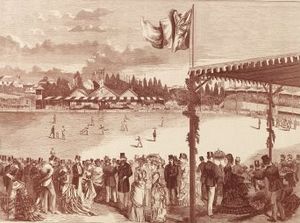
In February 1867, the team went to Sydney. They planned an overseas tour. The New South Wales captain, Charles Lawrence, invited the team to his hotel. Their first match was stopped when police arrested Wills. He was in jail for breaking a contract. He and a tour promoter were fighting over who would manage the team. After Wills was released, the promoter stole money. This left the team stranded in Sydney. Lawrence organized a "benefit" match for the team. He then joined them on their travels. By the end of the tour in New South Wales, Lawrence had replaced Wills as captain.
The team returned to Victoria in May. Lawrence stayed with the team. Wills went to Geelong to play football. The remaining players later went to England in 1868. This was the first Australian sports team to travel overseas. Wills was upset he was not included.
Later Sporting Years
Wills had no other job prospects. He joined the MCC as a professional player in 1867–68. But he was called a 'tutor' to keep his amateur status.
In December 1867, Victoria beat New South Wales. Wills took nine wickets. Wills had been Victoria's captain for over ten years. A sportswriter said Wills, as a paid player, could not lead amateurs. When he lost the captaincy in March 1869, he refused to play. But he changed his mind. This was the last match played on the Domain. Victoria won. Wills took 7 wickets.
After this, Wills said he would not play for Victoria again. He planned to return to Cullin-la-ringo. But his mother did not want him there. The MCC took him back as a tutor. Wills' former Aboriginal teammates, Mullagh and Cuzens, joined him as paid bowlers.
Wills' appearance had changed. He was gaining weight and losing hair. He looked older. In 1870, he said his body felt "stiff". This was the first time he hinted his skills were fading.
Final Years and Legacy
By 1877, Wills' cricket career was declining. He played for smaller clubs in Geelong. He earned little money. He applied for jobs at the MCC but was rejected. He felt old cricketers were "left in the cold".
After retiring from football, Wills became an umpire. He also worked on committees. He donated money and trophies for football. He was vice-president of Geelong from 1873 to 1876. He briefly served as a delegate for the Victorian Football Association (VFA) in 1877. In 1878, he was a central umpire. He defended his decisions in a public letter. That year, Wills was broke and in debt. He sold land in Geelong. He moved to South Melbourne with Sarah Barbor.
Wills convinced the South Melbourne Cricket Club to open its ground for football in winter. This helped the grass. Other clubs followed this idea. Football fields became oval-shaped in the late 1870s. The sport spread across Australia. Melbourne matches had the largest football crowds in the world.
In late 1878, the MCC rejected Wills' last job application. His income from cricket stopped. From February 1879, Wills lived in Heidelberg, a small village. He made only two trips outside Heidelberg. In January 1880, Tom Horan saw him at the MCG. Wills sometimes coached the Heidelberg Cricket Club. On March 13, 1880, he played his last game. He took five wickets. In his last letters, he wrote that he felt "out of the world" in Heidelberg. He wanted to escape to Tasmania. He begged his brothers for money. He promised not to bother them again.
Personality and Playing Style
Wills was seen as unusual. He could be difficult, but also kind and charming. He often got into trouble. He seemed not to understand how his actions affected others. He was obsessed with sport. He showed little interest in anything else. People often forgave him, even when he misbehaved. He was popular because he treated everyone equally. People sang songs about him.
Wills' writing style was unique. His letters were full of jokes and references. He sometimes wrote in a confused way. He once wrote, "I do not know what I am standing on... everything seems so curious." Some people thought he might have had epilepsy or bipolar illness.
In 1923, the MCC found Wills' old cricket cap. They put it on display. His brother Horace said Tom was the "nicest man I ever met". He said Tom was carefree and had a sweet temper.
Cricket and Football Skills
Wills is known as Australia's first great cricketer. He was very athletic and seemed strong. He was very competitive. He always wanted to win. He was a natural leader. He made his teammates confident. He always had clever ideas during a match. He was called a "cricket crank and genius".
Wills was an all-rounder. He was a great bowler. He could change his speed and style. He was known for his slow deliveries. His fast balls could also bounce high. English batsman Sir David Serjeant said Wills was the only bowler he feared. Wills would try to trick the umpire so he could throw the ball harder. His throws were compared to a baseball pitcher.
As a batsman, Wills focused on defence. He said, "The ball can't get through the bat." He could also hit the ball very hard. He once hit a ball for eight runs. He was an excellent fielder. He was good at catching balls and running out batsmen.
Wills was a very skilled footballer. He was quick and hard to catch. He was good at different positions. He was considered the greatest and smartest captain in early football. He helped bring new tactics and skills to the game. In July 1860, he used an innovative game plan. He positioned his Richmond players down the field from defence to attack. They scored by using short kicks. That same month, he used a basic form of flooding. He also told his players to run with the ball in open spaces. Historian Bernard Whimpress said Wills was an innovator who would fit into today's game.
Wills' Lasting Impact
Tom Wills was Australia's first famous sportsman. But people started to forget him during his lifetime. In 2006, The Bulletin named him one of the 100 most influential Australians. A detailed book about him was published in 2008.
Wills' unmarked grave was restored in 1980. The MCC put up a headstone. He was added to the Sport Australia Hall of Fame in 1989. He was also one of the first members of the Australian Football Hall of Fame in 1996. There is a room named after him at the MCG. A statue of Wills stands outside the MCG. It shows him umpiring the famous 1858 football match. In 2008, the AFL held the Tom Wills Round. This was to celebrate the 150th anniversary of that match. A busy freeway interchange in Melbourne was also named the Tom Wills Interchange. In 2013, Tom Wills Oval opened in Sydney. It is a training base for the Greater Western Sydney Giants AFL team.
The "Father of Football"
The role Wills played in starting Australian football was not fully recognized at first. By the late 1870s, his 1858 letter was seen as a very important document. He wrote that he tried to promote football in 1857. But it was not popular until 1858. By 1908, H. C. A. Harrison was known as the "father of football". Wills was the next most remembered pioneer. Harrison said Wills started the sport.
More recent historians have changed this view. They say Harrison did not help write the first rules in 1859. He also did not play in the 1858 games. Because of this, some historians now say Wills was the main founder or father of the game. Historian Geoffrey Blainey said Wills did not completely found the game. But he was more than just one of many founders.
Some people say Wills was left out of the game's history. But others disagree. They say the contributions of other pioneers were more overlooked than Wills'. Some historians think Wills' role has been overemphasized. They say he was more interested in playing than organizing. British historian Tony Collins compared Wills to others who were wrongly called inventors of sports. But journalist James Coventry pointed out Wills' long playing career. He also noted his influence as a captain-coach and his administrative work.
See also
- Cultural depictions of Tom Wills
- List of Australian rules footballers and cricketers
- List of cricketers called for throwing in top-class cricket matches in Australia
- List of Victoria first-class cricketers
- Tom Wills Medal


